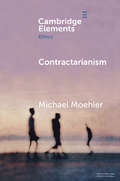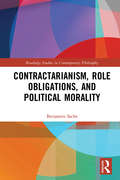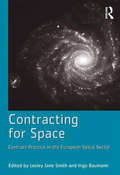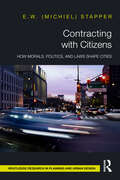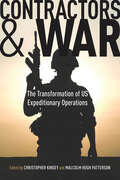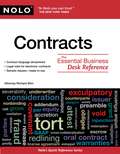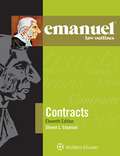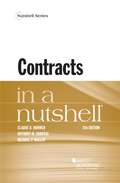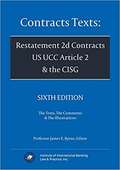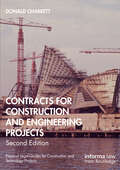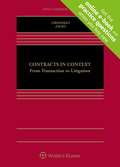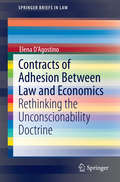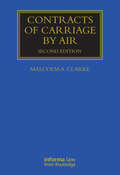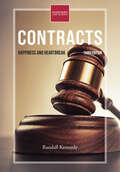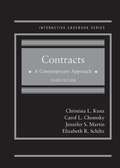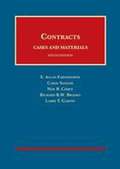- Table View
- List View
Contract, Tort and Restitution Statutes 2012-2013 (Routledge Student Statutes)
by James Devenney Howard Johnson‘Focused content, layout and price - Routledge competes and wins in relation to all of these factors’ - Craig Lind, University of Sussex, UK ‘The best value and best format books on the market.’ - Ed Bates, Southampton University, UK Routledge Student Statutes are: • Exam Friendly: un-annotated and conforming to exam regulations • Tailored to fit your course: 80% of lecturers we surveyed agree that Routledge Student Statutes match their course and cover the relevant legislation • Trustworthy: Routledge Student Statutes are compiled by subject experts, updated annually and have been developed to meet student needs through extensive market research • Easy to use: a clear text design, comprehensive table of contents, multiple indexes and highlighted amendments to the law make these books the most student-friendly Statutes on the market Competitively Priced: Routledge Student Statutes offer content and usability rated as good or better than our major competitor, but at a more competitive price • Supported by a Companion Website: presenting scenario questions for interpreting Statutes, annotated web links, and multiple-choice questions, these resources are designed to help students to be confident and prepared.
Contractarianism (Elements in Ethics)
by Michael MoehlerThis Element provides a systematic defense of moral contractarianism as a distinct approach to the social contract. It elucidates, in comparison to moral conventionalism and moral contractualism, the distinct features of moral contractarianism, its scope, and conceptual and practical challenges that concern the relationship between morality and self-interest, the problems of assurance and compliance, rule-following, counterfactualism, and the nexus between morals and politics. It argues that, if appropriately conceived, moral contractarianism is conceptually coherent, empirically sound, and practically relevant, and has much to offer to contemporary moral philosophy.
Contractarianism, Role Obligations, and Political Morality (Routledge Studies in Contemporary Philosophy)
by Benjamin SachsThis book argues that contractarianism is well suited as a political morality and explores the implications of deploying it in this way. It promises to revive contractarianism as a viable political theory, breaking it free from its Rawlsian moorings while taking seriously the long-standing objections to it. It’s natural to think that the state owes things to its people: physical security, public health and sanitation services, and a functioning judiciary, for example. But is there a theory—a political morality—that can explain why this is so and who the state’s people are? This new contractarianism deploys a reversed state of nature thought experiment as the starting point of political theorizing. From this starting point it develops a political morality: a theory of the common ground of the role moralities attached to the various roles within the state. Contractarianism, so understood, can provide a basis for already popular ideas in political theory—such as political and legal liberalism—and overturn conventional wisdom, for example that the state is obligated to secure justice and that animals should have no legal standing. Contractarianism, Role Obligations, and Political Morality will be of interest to scholars and advanced students working in moral and political philosophy.
Contracting International Employee Participation: Global Framework Agreements (International Law and Economics)
by Felix HadwigerIn the last two decades, multinational companies (MNCs) and global union federations (GUFs) have started to negotiate so-called global framework agreements (GFAs) which define minimum standards for labor conditions across their locations. This book focuses on the question why companies conclude GFAs, and identifies four groups of incentives: reduction and privatization of conflicts; public relations; promotion of equal competitive conditions; exogenous requirements and avoidance of public regulation. Based on an in-depth analysis of incentives considered to play a dominant role in the decision of companies to conclude GFAs, the book attempts to predict under which conditions GFAs can be expected to proliferate in the future.
Contracting Law
by Amy Kastely Deborah Post Nancy Ota Deborah ZalesneRevised and updated to 2015, the fifth edition of Contracting Law continues the clear explanations of contract doctrine, engaging cases, and thought-provoking cultural and historical materials that have made this casebook a favorite of students and professors. Students and faculty appreciate the fact that no separate statutory supplement is necessary. Selected provisions from the Restatement Second of Contracts and the Uniform Commercial Code are included in the casebook as appendices. The revised Student Workbook (purchased separately) is updated to complement the fifth edition with flow charts, vocabulary lists, problems and structured exercises to help students understand legal doctrines, case briefing, and synthesis. Students can use the workbook independently or exercises can be used in class discussions. The fifth edition augments the cultural material with notes and questions showing the social contexts for specific contract doctrines. Many sections are shortened and reorganized for ease of use in 3-, 4-, or 5-credit courses, while UCC coverage is maintained for those courses designed to include sales law.
Contracting for Space: Contract Practice in the European Space Sector
by Ingo BaumannRecent significant developments in the European space sector have had an impact on business and the growth of national and European commercial space law. This book analyses and assesses the legal issues and key factors influencing the space sector in Europe. It is an up-to-date guide to the regulatory background of space projects and examines the typical legal problems which need to be solved by practitioners in the field. Taking into account public and commercial international law and practice, this book examines substantive issues of law specific to launchers, satellite manufacturers and space service providers with contributions from leading experts and practitioners in the field of European space law and policy.
Contracting with Citizens: How Morals, Politics, and Laws Shape Cities (Routledge Research in Planning and Urban Design)
by E.W. (Michiel) StapperThis book demonstrates that contracts, community intermediaries, and participatory processes are closely interlinked, and they can change urban politics.In participatory processes, residents negotiate with policymakers about the future of their neighborhood. In the last few decades, this happened increasingly in co-creation sessions where citizens are deemed to have an equal position vis-a-vis developers and civil servants. The goal of this book is to understand and theorize how these negotiations affect collective action. The book will scrutinize the role of contracts, community intermediaries, and participatory processes in development projects and planning policies. Using a comparative case study of Amsterdam, Hamburg, and New York, this book reveals how seemingly fresh and novel planning practices are used to justify processes of capital accumulation and reveals how morals, politics, and law can create institutional change.The book presents a novel theoretical approach to studying urban politics, putting emphasis on (private) law and the material arrangements of participatory processes. It will be of interest to researchers and students of planning, geography, sociology, public administration, and law and will provide valuable lessons for practitioners interested in understanding the effects of contractual governance on neighborhoods.
Contractor Health and Safety Compliance for Small to Medium-Sized Construction Companies
by Clinton Aigbavboa Wellington Thwala Zakari MustaphaThis book explores the formation of small and medium-sized construction company's (SME) compliance with health and safety issues in developing countries. Little has been written about the formation of SME contractors' health and safety compliance for developing countries, especially, in the sub-sahara regions where construction and infrastructure development activities have significantly increased in order to serve the development mandate of those countries. Thus, this book will provides insight into construction safety for SMEs, as well as health and safety compliance, and its policy implementation trends and development.
Contractor Safety Management
by Gregory WiIIiam SmithA Winner of the Educational Award by the World Safety OrganizationContractor safety management is often seen as nothing more than a subset of general safety management in that no special consideration needs to be given to understanding the difficulties of the contract environment. This leaves contractors endlessly juggling competing and someti
Contractors and War: The Transformation of US Expeditionary Operations
by Christopher Kinsey Malcolm Hugh PattersonThe U. S. military is no longer based on a Cold War self-sufficient model. Today's armed forces are a third smaller than they were during the Cold War, and yet are expected to do as much if not more than they did during those years. As a result, a transformation is occurring in the way the U. S. government expects the military to conduct operations-with much of that transformation contingent on the use of contractors to deliver support to the armed forces during military campaigns and afterwards. Contractors and Warexplains the reasons behind this transformation and evaluates how the private sector will shape and be shaped by future operations. The authors are drawn from a range of policy, legislative, military, legal, and academic backgrounds. They lay out the philosophical arguments supporting the use of contractors in combat and stabilization operations and present a spectrum of arguments that support and criticize emergent private sector roles. The book provides fresh policy guidance to those who will research, direct, and carry out future deployments.
Contracts
by Richard Stim AttorneyUnderstand virtually any contract and sign on the dotted line with confidence. Contracts are a part of everyday life now -- you can't download a piece of software or accept an employment offer without having to click "I agree" or sign at least one piece of paper. But very few of us are able to decipher the legalese in these documents, leading most people to hesitate before committing to a contract's terms. Contracts: The Essential Business Desk Reference is the first book to explain contract terms in language for the layperson. This indispensable A to Z guide covers: definitions of common terms found in contracts how to decipher the language of contracts which clauses are important and which aren't how to change contracts Contracts: The Essential Business Desk Reference will help you save money by coaching you on which clauses are important so that you can avoid a pricey professional review by a lawyer. Written in plain English, this book is especially useful for law students and business owners, but still contains enough detail to have a place on nearly any lawyer's bookshelf.
Contracts (The Emanuel Law Outlines)
by Steven L. EmanuelThe most trusted name in law school outlines, Emanuel Law Outlines support your class preparation, provide reference for your outline creation, and supply a comprehensive breakdown of topic matter for your entire study process. Created by Steven Emanuel, these course outlines have been relied on by generations of law students. Each title includes both capsule and detailed versions of the critical issues and key topics you must know to master the course. Also included are exam questions with model answers, an alpha-list of cases, and a cross reference table of cases for all of the leading casebooks.
Contracts In A Nutshell (Nutshells Series)
by Claude Rohwer Anthony Skrocki Michael MalloyThis Nutshell provides a comprehensive guide to the law of contracts. It contains expert explanations of contract concepts under both the common law and Article 2 of the Uniform Commercial Code. It also includes the basics of the Law of Restitution and an introduction to digital contracting.
Contracts Texts: Restatement 2d Contracts, UCC Article 2 and CISG
by Professor James E. ByrneContracts Texts: Restatement 2d Contracts, UCC Article 2 and CISG Fifth Edition
Contracts for Construction and Engineering Projects (Practical Legal Guides for Construction and Technology Projects)
by Donald CharrettContracts for Construction and Engineering Projects provides unique and invaluable guidance on the role of contracts in construction and engineering projects. The work explores various aspects of the intersection of contracts and construction projects involving the work of engineers and other professionals engaged in construction, whether as project managers, designers, constructors, contract administrators, schedulers, claims consultants, forensic engineers or expert witnesses. Compiling papers written and edited by the author, refined and expanded with additional chapters in this new edition, this book draws together a lifetime of lessons learned in these fields and covers the topics a practising professional might encounter in construction and engineering projects, developed in bite-sized chunks. The chapters are divided into five key parts: 1. The engineer and the contract 2. The project and the contract 3. Avoidance and resolution of disputes 4. Forensic engineers and expert witnesses, and 5. International construction contracts. The inclusion of numerous case studies to illustrate the importance of getting the contract right before it is entered into – and the consequences that may ensue if this is not done – makes this book essential reading for professionals practising in any area of design, construction, contract administration, preparation of claims or expert evidence, as well as construction lawyers who interact with construction professionals.
Contracts for Infrastructure Projects: An International Guide to Application (Practical Legal Guides for Construction and Technology Projects)
by Philip Loots Donald CharrettContracts for Infrastructure Projects: An International Guide provides a guide to the law relating to construction contracts for infrastructure projects; it is intended for the use of engineers and other professionals who are involved in the negotiation and administration of construction contracts, to enable them to understand the risks involved, and how to minimise them. The principles of construction law outlined in this book apply to small construction contracts as well as very large contracts for which the contract sum may be in the billions of dollars. The focus of the book is on construction contracts entered into by commercial organisations operating in a business environment. Contract law generally assumes that such parties are of equal bargaining power and puts relatively few fetters on their ability to agree on the terms of their bargain. However, where legislation impacts on the execution of construction projects or the operation of construction contracts it may be of major importance in protecting the rights of weaker parties or third parties. It is assumed that the users of this book will be familiar with the general concepts of tendering and contracting for engineering and construction projects but may not have any formal knowledge of the law. To the extent possible, the emphasis is on general principles of contract law that are widely accepted in many jurisdictions. Examples are drawn from case law in a number of common law jurisdictions, as well as from civil codes.
Contracts in Context: From Transaction to Litigation (Aspen Casebook)
by Nadelle Grossman Eric ZacksThis new casebook focuses on the transactional nature of contracts. In addition to describing the law of contracts and how the law is applied in litigation, Contracts in Context: From Transaction to Litigation explores why parties enter into contracts, how written contracts are customarily structured, and why and how parties use contract design and terms to achieve their goals. It explores how parties contract around default requirements of the law, in addition to satisfying mandatory aspects of the law, through contracts. The book describes the role of both the transactional lawyer and litigator in working with contracts. It presents much of the material in expository fashion rather than only or primarily through cases. It then challenges students to apply that law through transactional and litigation practice and simulation problems.
Contracts in the Real World
by Lawrence A. CunninghamContracts, the foundation of economic activity, are both vital and misunderstood. This book corrects the misunderstandings through a series of engaging stories involving such diverse individuals as Martin Luther King, Maya Angelou, Clive Cussler, Lady Gaga and Donald Trump. Capturing the essentials of this subject, the book explores recurring issues people face in contracting. It shows how age-old precedents and wisdom still apply today and how contract law's inherent dynamism cautions against exuberant reforms. The book will appeal to the general reader and specialists in the field alike, and to both teachers and students of contracts.
Contracts of Adhesion Between Law and Economics: Rethinking the Unconscionability Doctrine (SpringerBriefs in Law)
by Elena D'AgostinoThis book examines the most controversial issues concerning the use of pre-drafted clauses in fine print, which are usually included in consumer contracts and presented to consumers on a take-it-or-leave-it basis. By applying a multi-disciplinary approach that combines consumer's psychology and seller's drafting power in the logic of efficiency and good faith, the book provides a fresh and unconventional analysis of the existing literature, both theoretical and empirical. Moving from the unconscionability doctrine, it criticizes (and in some cases refutes) its main conclusions based on criteria which are usually invoked to sustain the need for public intervention to protect consumers, and specifically related to Law (contract complexity), Psychology (consumer lack of sophistication criterion) and Economics (market structure criterion). It also analyzes the effects of different regulations, such as banning vexatious clauses or mandating disclosure clauses, showing that none of them protect consumers, but in fact prove to be harmful when consumers are more vulnerable, that is whenever sellers can exploit some degree of market power. In closing, the book combines these disparate aspects, arguing that the solution (if any) to the problem of consumer exploitation and market inefficiency associated with the use of contracts of adhesion in these contexts cannot be found in removing or prohibiting hidden clauses, but instead has to take into account the effects of these clauses on the contract as a whole.
Contracts of Carriage by Air: Contracts Of Carriage By Land And Air (Maritime and Transport Law Library)
by Malcolm A. ClarkeContracts of Carriage by Air, Second Edition contains annotated analysis of the provisions of the international conventions governing the carriage of goods and passengers by air. This book provides you with practical advice and brings you: • An overall view of the two liability regimes, followed by a short history of the Warsaw Convention in its various versions and what led to agreement on a single regime, the Montreal Convention, as well as the threat to uniformity posed by EC Directives.• A statement of the rules of interpretation applicable to conventions of uniform law, illustrated mainly by decisions of the air conventions.• Commentary on the text of the 1999 Montreal Convention together with commentary on the text of the 1967 Warsaw Convention.• Reference to decisions of the courts not only of the UK but also those of other common law countries, notably the USA, and countries of civil law, notably France and Germany.
Contracts, third edition: Happiness and Heartbreak
by Randall KennedyA casebook to be used as the primary text for first-year law school contracts courses, written by a leading scholar in contract law.Renting a home, buying a ticket, downloading an app—humans enter into contracts constantly, often with little consciousness of the legal implications. We typically become alert to the consequences only when a problem arises. Contracting can increase our happiness by enabling us to do things that we would be otherwise unable to do, but heartbreak follows when things go wrong. This casebook, which can be used as a primary text for a first-year law school contracts course, covers a wide spectrum of quandaries that emerge in contract law, from problems of overreach and interpretation to enforcement and fraud. Taken together, these cases offer an exploration of contract pathology and introduce students to concepts that are essential to understanding the vast subject of Anglo-American contract law. This book is part of the Open Casebook series from Harvard Law School Library and the MIT Press.Primary text for a first-year law school contracts course Developed for use at Harvard Law School by a leading scholar in contract law Diverse cases show differing approaches to a range of problems within contractingClassroom tested
Contracts: A Contemporary Approach (Interactive Casebook Ser.)
by Elizabeth Schiltz Christina Kunz Carol ChomskyAbout 25% shorter than the previous edition, the third edition of this casebook contains both traditional edited case opinions and numerous brief example cases so students can learn from reviewing multiple applications of the legal rules. Well placed text boxes provide "reading critically" questions preceding cases and supplemental information and additional questions at crucial junctures. Tables and flowcharts demonstrate connections among concepts and give visual learning cues. With the guidance provided, students are able to prepare more effectively for class, so they start class at a more sophisticated level and proceed more easily to deeper analysis. The book also includes frequent problem sets, both essay and multiple-choice, to test and expand students' understanding. The accompanying electronic version links directly to cited sources and to related multiple-choice problems. In addition to classic contract cases the book includes new cases chosen because of their teachability and because they address current issues and modern business practices. "Practice Pointers" provide a transactional focus by exploring practical implications of legal doctrine. The book no longer contains the text of Restatement and UCC provisions, so it should be accompanied by a statutory supplement.
Contracts: A Context and Practice Casebook, 3rd ed
by Michael Hunter Schwartz Adrian J. WaltersEvery chapter in this innovative casebook places students in roles as practitioners handling simulated law practice problems; provides context in the form of an overview of the law, similar to that which an attorney would read before reading cases in a new subject area; includes questions designed to encourage students to find the applicable statutes and cases on point in the state where the student is planning to practice law; includes exercises, visual aids, and case reading scaffolds, designed to engage students with a wide range of learning styles; and ends with professionalism questions addressing ethical and professional identity questions suggested by the materials in the chapter. The third edition of Contracts: A Context and Practice Casebook reflects an effort to move the book and accompanying teaching materials into the next generation. Like prior editions of the book, the third edition adopts a learner-centered approach and draws deeply from modern brain science. The book contains dozens of problems, many of which the authors created in collaboration with practicing attorneys, and, the very extensive teacher's manual, includes learning objectives for each doctrinal area, dozens of multiple-choice questions, and detailed teaching notes. This new edition includes the integration of the multiple-choice questions, which have been substantially revised with Carolina Academic Press's Core Knowledge software, and the use of color throughout the book, which adds visual interest, promotes clarity and provides emphasis.
Contracts: Cases and Doctrine (Aspen Casebook)
by Randy E. Barnett Nathan B. OmanContracts: Cases and Doctrine features a mix of lightly-edited classic and contemporary cases that stresses current contract doctrine along with the essential lawyering skill of case analysis--how to sift through the facts of the case to discern the prevailing rules and theory. Randy Barnett and Nate Oman's innovative text introduces each case and provides the historical background of the iconic cases that make the study of contract law engaging. Study Guide questions help students identify salient issues as they read each case. Judicial biographies of each judge provide additional context. The Seventh Edition has been edited to delete materials that are seldom covered in a 1L class. This edition adds new cases that have been chosen for their topicality, facts, or pedagogical usefulness. New areas covered include so-called "smart contracts" and the relationship between restitution and contract. As always, we have tried to focus on cases with facts that will be easier to teach. New cases in this edition include a contract with a spy that turns out to be a double agent for the KGB, the effect of pandemics on contractual obligations, the gambling shenanigans of a royal prince, and emotional support animals.
Contracts: Cases and Materials (University Casebook)
by Richard R. W. Brooks Carol Sanger E. Allan Farnsworth Neil B. Cohen Larry T. GarvinAs a part of our CasebookPlus offering, you'll receive the print book along with lifetime digital access to the eBook. Additionally you'll receive 12-month online access to the Learning Library which includes quizzes tied specifically to your book, an outline starter and digital access to leading study aids in that subject and the Gilbert® Law Dictionary. The included study aids are Contracts in a Nutshell, Exam Pro on Contracts and Acing Contracts. The redemption code will be shipped to you with the book. <P><P> This casebook traces the development of contract law in the English and American common law traditions. Like earlier editions, the 8th edition features authoritative introductions to major topics, carefully selected cases, and well-tailored notes and problems. The casebook is ecumenical in its outlook, presenting a well-balanced approach to the study of contract law without ever losing sight of the importance of doctrine in all its detail. Cases are situated within a variety of disciplines history, economics, philosophy, and ethics and present the law in a variety of settings commercial, familial, employment, and sports and entertainment. The 8th edition will feel familiar yet fresh to current users and both exciting and comfortable to newcomers to contracts or to this casebook.

